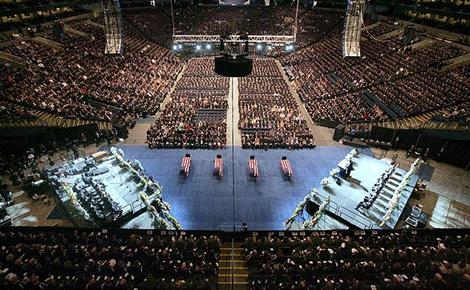In a basketball arena filled with uniformed officers from across the continent, four members of the Oakland Police Department were remembered Friday as eager servants of the city where - six days earlier, in a single afternoon of horrific gun violence - they paid for their dedication with their lives.
"When duty called, they did not hesitate to answer," said U.S. Sen. Dianne Feinstein (D-Calif.), one of a handful of elected officials who spoke at the three-hour service in Oracle Arena. "When danger lurked, they did not back away. And when the time came to make the ultimate sacrifice, their final hour was their finest."

The flag-draped caskets of the four slain Oakland police officers at their funeral.
It was a ceremony filled not only with soaring oratory, cannon salutes and helicopter flyovers, but also with poignant moments and touching memories. These were offered by colleagues and family members who spoke about each of the four men -- Sgts. Ervin Romans, Daniel Sakai and Mark Dunakin and Officer John Hege.
Dunakin and Hege were motorcycle patrolmen who shortly after 1 p.m. last Saturday pulled over wanted parolee Lovelle Mixon for what was described as a "routine traffic stop" in east Oakland.
Mixon, a 26-year-old with a long criminal record, shot the two officers with a handgun and then, witnesses reported, stood over them and fired coup de grace rounds into his victims.
He fled to his sister's apartment around the corner where, two hours later, a SWAT team led by Romans and Sakai stormed the unit. Mixon shot them through a closet door with an assault rifle, wounded a third officer and then was killed by police, according to authorities.
The magnitude of the loss moved law enforcement agencies from Canada and across the United States to send contingents to the service: Mounties in their bright red jackets, Boston police in their dress blues, LAPD motorcycle officers who rode in formation all the way up Interstate 5 and attended the ceremony in their high, leather boots.
All 800-plus members of the Oakland Police Department attended, their duties on the streets taken up for the day by other agencies. They wore white gloves and somber faces as they marched into rows of seats on the arena floor.
The already seated crowd stood as one and watched the 15-minute procession in silence. There were several such long silences at pivotal moments in the ceremony, and they were almost as moving as the eulogies.
A large blue curtain parted and the coffins were rolled out, one by one. Each was escorted by officers as pallbearers and by immediate family. A bagpipe and drum corps, composed mainly of San Francisco police officers, played a medley of "Dawning of the Day" and "Going Home."
The last coffin to emerge was that of Sakai who, among other duties, served as a K-9 officer.
When his casket had been placed in a row with the others, each before their respective family members, Sakai's partner, a German shepherd named Doc, was brought in on a leash. The dog stood at the casket and barked several times before being led away.
After Interim Police Chief Howard Jordan, Feinstein, Sen. Barbara Boxer, Gov. Arnold Schwarzenegger, Atty. Gen. (and former Oakland mayor) Jerry Brown spoke, it was time for the rank-and-file officers and kin of the fallen to bring intimacy to the service.
There were tears and occasional sad smiles as the speakers worked through their memories of childhood antics, family bonds, station house pranks, love of police work, personal passions and deep friendships galvanized in dangerous moments.
Though the shootings have been characterized in some quarters as evidence of strains between Oakland police and portions of the city, this was not a day for divisiveness.
Lawrence Eade, a retired lieutenant who spoke as a friend of Hege, expressed frustration over continued media reports on the subject.
"I need to set the record straight," he boomed. "The citizens are not warring against the police. There is no war between us and, I might add, you cannot create one."
One of the most moving speakers was Capt. Ed Tracey, who, after making his way to the podium, pulled off his white gloves and sighed, loudly. There were bags under his eyes. His voice faltered as he spoke. Tracey explained that he supervised both the tactical teams and traffic units.
"These were my men," he said simply. Please know," he said, "that these officers died doing absolutely what they loved, being Oakland police officers, riding motors, kicking in doors, serving on SWAT."
Tracey ended by giving thanks to a passerby who had attempted to save the stricken motorcycle officers before paramedics arrived.
"To the brave man who provided CPR to our fallen heroes, we thank you," Tracey said. "We thank you from the bottom of our heart. Your actions let us know that day that they did not die in vain, that the people they were there to protect and serve were the ones who helped them."
This was met with sustained applause, not only from Oakland police ranks seated on the floor of the arena, but from the sections in the upper reaches that had been reserved for civilians.











